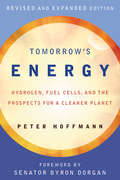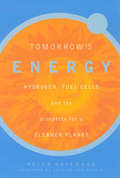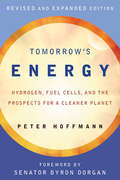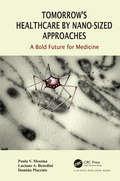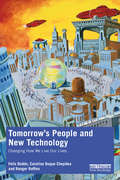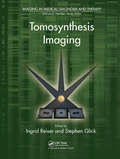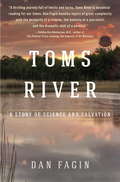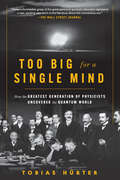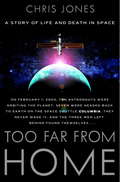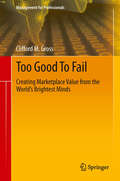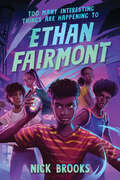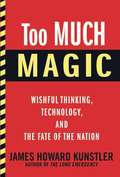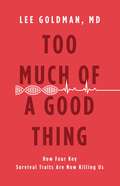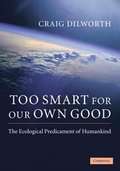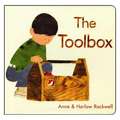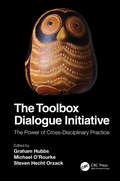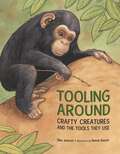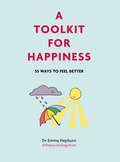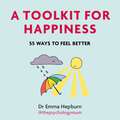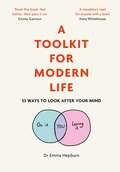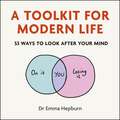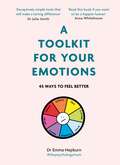- Table View
- List View
Tomorrow's Energy
by Peter HoffmannHydrogen is the most abundant element in the universe. An invisible, tasteless, colorless gas, it can be converted to nonpolluting, zero-emission, renewable energy. When burned in an internal combustion engine, hydrogen produces mostly harmless water vapor. It performs even better in fuel cells, which can be 2. 5 times as efficient as internal-combustion engines. Zero-emission hydrogen does not contribute to CO2-caused global warming. Abundant and renewable, it is unlikely to be subject to geopolitical pressures or scarcity concerns. In this new edition of his pioneering book Tomorrow's Energy, Peter Hoffmann makes the case for hydrogen as the cornerstone of a new energy economy. Hoffmann covers the major aspects of hydrogen production, storage, transportation, fuel use, and safety. He explains that hydrogen is not an energy source but a carrier, like electricity, and introduces the concept of "hydricity," the essential interchangeability of electricity and hydrogen. He brings the hydrogen story up to date, reporting on the latest developments, including new hydrogen and fuel-cell cars from GM, Daimler, BMW, Honda, and Toyota. He describes recent political controversies, including Obama administration Energy Secretary (and Nobel laureate in Physics) Steven Chu's inexplicable dismissal of hydrogen--which puts him at odds with major automakers, German Chancellor Angela Merkel, and others. Our current energy system is a complex infrastructure, and phasing in hydrogen will take effort and money. But if we consider the real costs of fossil fuels--pollution and its effects, international tensions over gas and oil supplies, and climate change--we would be wise to promote its development.
Tomorrow's Energy: Hydrogen, Fuel Cells, and the Prospects for a Cleaner Planet
by Peter HoffmannHow hydrogen—nonpolluting and easy to produce—could become the fuel of the future.Hydrogen is the quintessential eco-fuel. This invisible, tasteless gas is the most abundant element in the universe. It is the basic building block and fuel of stars and an essential raw material in innumerable biological and chemical processes. As a completely nonpolluting fuel, it may hold the answer to growing environmental concerns about atmospheric accumulation of carbon dioxide and the resultant Greenhouse Effect. In this book Peter Hoffmann describes current research toward a hydrogen-based economy. He presents the history of hydrogen energy and discusses the environmental dangers of continued dependence on fossil fuels. Hydrogen is not an energy source but a carrier that, like electricity, must be manufactured. Today hydrogen is manufactured by "decarbonizing" fossil fuels. In the future it will be derived from water and solar energy and perhaps from "cleaner" versions of nuclear energy. Because it can be made by a variety of methods, Hoffmann argues, it can be easily adapted by different countries and economies. Hoffmann acknowledges the social, political, and economic difficulties in replacing current energy systems with an entirely new one. Although the process of converting to a hydrogen-based economy would be complex, he demonstrates that the environmental and health benefits would far outweigh the costs.
Tomorrow's Energy, revised and expanded edition: Hydrogen, Fuel Cells, and the Prospects for a Cleaner Planet (The\mit Press Ser.)
by Peter HoffmannHow the use of nonpolluting, zero-emission hydrogen as fuel could be the cornerstone of a new energy economy.Hydrogen is the most abundant element in the universe. An invisible, tasteless, colorless gas, it can be converted to nonpolluting, zero-emission, renewable energy. When burned in an internal combustion engine, hydrogen produces mostly harmless water vapor. It performs even better in fuel cells, which can be 2.5 times as efficient as internal-combustion engines. Zero-emission hydrogen does not contribute to CO2-caused global warming. Abundant and renewable, it is unlikely to be subject to geopolitical pressures or scarcity concerns. In this new edition of his pioneering book Tomorrow's Energy, Peter Hoffmann makes the case for hydrogen as the cornerstone of a new energy economy.Hoffmann covers the major aspects of hydrogen production, storage, transportation, fuel use, and safety. He explains that hydrogen is not an energy source but a carrier, like electricity, and introduces the concept of “hydricity,” the essential interchangeability of electricity and hydrogen. He brings the hydrogen story up to date, reporting on the latest developments, including new hydrogen and fuel-cell cars from GM, Daimler, BMW, Honda, and Toyota. He describes recent political controversies, including Obama administration Energy Secretary (and Nobel laureate in Physics) Steven Chu's inexplicable dismissal of hydrogen—which puts him at odds with major automakers, German Chancellor Angela Merkel, and others.Our current energy system is a complex infrastructure, and phasing in hydrogen will take effort and money. But if we consider the real costs of fossil fuels—pollution and its effects, international tensions over gas and oil supplies, and climate change—we would be wise to promote its development.
Tomorrow's Healthcare by Nano-sized Approaches: A Bold Future for Medicine
by Paula Veronica Messina Benedini Luciano Damian PlacenteNanomedicine, a scientific branch of nanotechnology that operates on the same scale as biology, offers the possibility of influencing the healing process from inside of the body by manipulating the matter at cellular or molecular levels. Throughout this book, current healing approaches based on this revolutionary new technology are summarized from a scientific assessment. The aim of the authors is to give, through select examples, a deep insight to nanotechnology status and the great progress that its rigorous application will bring to human health. The authors' commitment is to broaden the vision of health professionals who will eventually be the future users of this knowledge.
Tomorrow's People and New Technology: Changing How We Live Our Lives
by Felix Dodds Carolina Duque Chopitea Ranger RuffinsAs we witness a series of social, political, cultural, and economic changes/disruptions this book examines the Fourth Industrial Revolution and the way emerging technologies are impacting our lives and changing society. The Fourth Industrial Revolution is characterised by the emergence of new technologies that are blurring the boundaries between the physical, the digital, and the biological worlds. This book allows readers to explore how these technologies will impact peoples’ lives by 2030. It helps readers to not only better understand the use and implications of emerging technologies, but also to imagine how their individual life will be shaped by them. The book provides an opportunity to see the great potential but also the threats and challenges presented by the emerging technologies of the Fourth Industrial Revolution, posing questions for the reader to think about what future they want. Emerging technologies, such as robotics, artificial intelligence, big data and analytics, cloud computing, nanotechnology, biotechnology, the Internet of Things, fifth-generation wireless technologies (5G), and fully autonomous vehicles, among others, will have a significant impact on every aspect of our lives, as such this book looks at their potential impact in the entire spectrum of daily life, including home life, travel, education and work, health, entertainment and social life. Providing an indication of what the world might look like in 2030, this book is essential reading for students, scholars, professionals, and policymakers interested in the nexus between emerging technologies and sustainable development, politics and society, and global governance.
Tomosynthesis Imaging (Imaging in Medical Diagnosis and Therapy)
by Ingrid Reiser Stephen GlickAn innovative, three-dimensional x-ray imaging technique that enhances projection radiography by adding depth resolution, Tomosynthesis Imaging explores tomosynthesis, an emerging limited-angle tomographic imaging technology that is being considered for use in a range of clinical applications, and is currently being used for breast cancer screening
Toms River
by Dan Fagin<P>The riveting true story of a small town ravaged by industrial pollution, Toms River melds hard-hitting investigative reporting, a fascinating scientific detective story, and an unforgettable cast of characters into a sweeping narrative in the tradition of A Civil Action, The Emperor of All Maladies, and The Immortal Life of Henrietta Lacks. <P>One of New Jersey's seemingly innumerable quiet seaside towns, Toms River became the unlikely setting for a decades-long drama that culminated in 2001 with one of the largest legal settlements in the annals of toxic dumping. <P>A town that would rather have been known for its Little League World Series champions ended up making history for an entirely different reason: a notorious cluster of childhood cancers scientifically linked to local air and water pollution. <P>For years, large chemical companies had been using Toms River as their private dumping ground, burying tens of thousands of leaky drums in open pits and discharging billions of gallons of acid-laced wastewater into the town's namesake river. <P>In an astonishing feat of investigative reporting, prize-winning journalist Dan Fagin recounts the sixty-year saga of rampant pollution and inadequate oversight that made Toms River a cautionary example for fast-growing industrial towns from South Jersey to South China. <P>He tells the stories of the pioneering scientists and physicians who first identified pollutants as a cause of cancer, and brings to life the everyday heroes in Toms River who struggled for justice: a young boy whose cherubic smile belied the fast-growing tumors that had decimated his body from birth; a nurse who fought to bring the alarming incidence of childhood cancers to the attention of authorities who didn't want to listen; and a mother whose love for her stricken child transformed her into a tenacious advocate for change. <P>A gripping human drama rooted in a centuries-old scientific quest, Toms River is a tale of dumpers at midnight and deceptions in broad daylight, of corporate avarice and government neglect, and of a few brave individuals who refused to keep silent until the truth was exposed. <P><b> Winner of the Pulitzer Prize</b> <P><b> Winner of The New York Public Library's Helen Bernstein Book Award </b> <P><b>A New York Times Bestseller</b>
Too Big for a Single Mind: How The Greatest Generation Of Physicists Uncovered The Quantum World
by Tobias HürterNow in paperback: The epic story of how, amid two World Wars, history’s greatest physicists redefined reality—and ignited the atomic age “A new, exciting approach to the literature about this momentous era.”—The Wall Street Journal There may never be another era of science like the first half of the twentieth century, when a peerless cast of physicists—Albert Einstein, Marie Curie, Max Planck, Wolfgang Pauli, and others—came together to uncover the quantum world, a concept so outrageous and contrary to traditional physics that its own founders rebelled against it until the equations held up and fundamentally changed our understanding of reality. In page-turning chapters, Tobias Hürter takes us back to this momentous time in science history, when the creation of quantum theory demanded the combined efforts of friends and rivals, lovers and loners, straight-edged intellectuals and freethinking dreamers—and when, with the Nazis in pursuit of an atomic bomb, the stakes couldn’t be higher. In this stirring, grand narrative, brought to life by letters, notes, research papers, diaries, and memoirs, we witness the birth of an idea that revolutionized both physics and our world at large and unleashed the profound and terrifying power of the atom—and that ultimately stands as a testament to the boundless potential of genius in collaboration.
Too Far From Home: A Story of Life and Death in Space
by Chris JonesOn February 1, 2003, ten astronauts were orbiting the planet. Seven headed back to Earth on the space shuttle Columbia. They never made it. And the three men left behind found themselves too far from home. Chris Jones chronicles the efforts of the beleaguered Mission Control in Houston and Moscow as they work frantically against the clock to bring their men safely back to Earth, ultimately settling on a plan that felt, at best, like a long shot. Yet even amid the danger, the call of space is a siren song, and Too Far From Home details beautifully the majesty and mystique of space travel, while reminding us all how perilous it is to soar beyond the sky.
Too Good To Fail
by Clifford M. GrossToo Good to Fail: Creating Marketplace Value form the World's Brightest Minds is a guide for senior managers seeking to address their need to rapidly develop globally innovative products with constrained R&D budgets. It creates a practical strategy to address and bring together, for the first time, the emergence of open innovation networks, intellectual property, technology transfer and the ubiquitous compression of technology development time lines in a clear, connected and lucid manner. In the industry today, companies look to remain competitive in the face of the convergence of global innovation networks and sub-optimal equity markets. This book offers a new perspective, turning what was once perceived as a weakness into a strength. Drastic action is required to address the inability of companies to control the development of new technology. It requires relinquishing the illusion of control over new technology development and embracing crowdsourcing discoveries from the world's leading research institutions to exogenously replace the "R" of corporate "R&D." The synthesis of the literatures on open innovation and technology transfer should prove useful to the growing number of practitioners in technology transfer. The recent global emergence of Patent Box tax relief has for the first time created the financial incentives for firms to seek to create marketplace value from university intellectual capital, to improve both their competitiveness and after tax income.
Too Many Interesting Things Are Happening to Ethan Fairmont (Ethan Fairmont)
by Nick BrooksNick Brooks, award-winning filmmaker and author of Promise Boys, mixes out-of-this-world sci-fi with contemporary themes of friendship, community, and social justice in this hit middle-grade series. Ferrous City is suddenly a lot more interesting—in fact, a little too interesting for Ethan Fairmont. Ethan&’s beloved neighborhood is full of new faces. Lifelong residents are being priced out of their homes, and new businesses are replacing old favorites. At school, Ethan finds a rival in new-kid Fatima, an inventor who is just as science savvy as him. She even has TWO patents! Then there&’s the mysterious real estate agent with way too many questions for Ethan. Not to mention the extraterrestrial-obsessed Jodie and his &“Aliens Are Here&” club. It&’s all too much for Ethan and he begins to miss Cheese, his adorable six-eyed alien pal, even more. Fortunately for Ethan and his friends Kareem and Juan Carlos, distraction comes in the form of a top-secret project. Cheese left a communication device under Ethan&’s bed before exiting the planet. There&’s just one problem: they can&’t figure out how it works! As Ferrous City continues to change and eyes are everywhere, will the trio be able to keep their secret and reach Cheese, or is something nefarious brewing right next door? E.T. meets Stranger Things in the second title of this unforgettable sci-fi adventure series, perfect for readers ages 8 to 12.
Too Much Magic: Wishful Thinking, Technology, and the Fate of the Nation
by James Howard KunstlerWith vision, clarity of thought, and a pragmatic worldview, Kunstler argues that the time for magical thinking and hoping for miracles is over, and the time to begin preparing for the long emergency in America has begun.
Too Much of a Good Thing: How Four Key Survival Traits Are Now Killing Us
by Lee GoldmanDean of Columbia University's medical school explains why our bodies are out of sync with today's environment and how we can correct this to save our health.Over the past 200 years, human life-expectancy has approximately doubled. Yet we face soaring worldwide rates of obesity, diabetes, high blood pressure, mental illness, heart disease, and stroke. In his fascinating new book, Dr. Lee Goldman presents a radical explanation: The key protective traits that once ensured our species' survival are now the leading global causes of illness and death. Our capacity to store food, for example, lures us into overeating, and a clotting system designed to protect us from bleeding to death now directly contributes to heart attacks and strokes. A deeply compelling narrative that puts a new spin on evolutionary biology, TOO MUCH OF A GOOD THING also provides a roadmap for getting back in sync with the modern world.
Too Smart for Our Own Good: The Ecological Predicament of Humankind
by Craig DilworthWe are destroying our natural environment at a constantly increasing pace, and in so doing undermining the preconditions of our own existence. Why is this so? This book reveals that our ecologically disruptive behaviour is in fact rooted in our very nature as a species. Drawing on evolution theory, biology, anthropology, archaeology, economics, environmental science and history, this book explains the ecological predicament of humankind by placing it in the context of the first scientific theory of our species' development, taking over where Darwin left off. The theory presented is applied in detail to the whole of our seven-million-year history. Due to its comprehensiveness, and in part thanks to its extensive glossary and index, this book can function as a compact encyclopadia covering the whole development of Homo sapiens. It would also suit a variety of courses in the life and social sciences. Most importantly, Too Smart for Our Own Good makes evident the very core of the paradigm to which our species must shift if it is to survive. Anyone concerned about the future of humankind should read this groundbreaking work.
Tool Use in Animals: Cognition and Ecology
by Christophe Boesch Crickette M. Sanz Josep CallThe last decade has witnessed remarkable discoveries and advances in our understanding of the tool using behaviour of animals. Wild populations of capuchin monkeys have been observed to crack open nuts with stone tools, similar to the skills of chimpanzees and humans. Corvids have been observed to use and make tools that rival in complexity the behaviours exhibited by the great apes. Excavations of the nut cracking sites of chimpanzees have been dated to around 4-5 thousand years ago. Tool Use in Animals collates these and many more contributions by leading scholars in psychology, biology and anthropology, along with supplementary online materials, into a comprehensive assessment of the cognitive abilities and environmental forces shaping these behaviours in taxa as distantly related as primates and corvids.
The Toolbox
by Anne F. Rockwell Harlow RockwellLook inside this well-loved toolbox-there is so much to discover! It holds strong wrenches that turn, pliers that pinch, and sandpaper that smooths. There are nails, screws, and a hammer. A toolbox is a treasure trove for curious young builders.
The Toolbox Dialogue Initiative: The Power of Cross-Disciplinary Practice
by Hubbs, Graham / O’Rourke, Michael / Orzack, Steven HechtCross-disciplinary scientific collaboration is emerging as standard operating procedure for many scholarly research enterprises. And yet, the skill set needed for effective collaboration is neither taught nor mentored. The goal of the Toolbox Dialogue Initiative is to facilitate cross-disciplinary collaboration. This book, inspired by this initiative, presents dialogue-based methods designed to increase mutual understanding among collaborators so as to enhance the quality and productivity of cross-disciplinary collaboration. It provides a theoretical context, principal activities, and evidence for effectiveness that will assist readers in honing their collaborative skills. Key Features Introduces the Toolbox Dialogue method for improving cross-disciplinary collaboration Reviews the theoretical background of cross-disciplinary collaboration and considers the communication and integration challenges associated with such collaboration Presents methods employed in workshop development and implementation Uses various means to examine the effectiveness of team-building exercises Related Titles Fam, D., J. Palmer, C. Riedy, and C. Mitchell. Transdisciplinary Research and Practice for Sustainability Outcomes (ISBN: 978-1-138-62573-0) Holland, D. Integrating Knowledge through Interdisciplinary Research: Problems of Theory and Practice (ISBN: 978-1-138-91941-9) Padmanabhan, M. Transdisciplinary Research and Sustainability: Collaboration, Innovation and Transformation (ISBN: 978-1-138-21640-2)
Tooling Around: Crafty Creatures and the Tools They Use
by Ellen JacksonDig these crafty creatures!We all use tools every day: a pen to write a story, a paint brush to illustrate a book, a fork to eat dinner. But it's not just humans who use tools. Chimpanzees often poke sticks, straw, or blades of grass into termite mounds to draw out insects for a tasty treat. Veined octopuses have been observed carrying coconut shells—they crawl inside them and hide from predators when they need a rest. A New Caledonian crow can even bend a twig with its beak to use as a hook to dig out bugs. Scientists don't all agree on what counts as a tool, but young readers will be inspired to observe the animals that live around them and how they use various objects to find food, to attract a mate, to protect themselves, or to build or conceal a home.Renné Benoit's illustrations get closeup with each animal, exploring habitats, the special problems they face, and the ways they solve these problems—either by intelligence or instinct. Tooling Around: Crafty Creatures and the Tools They Use is a wonderful introduction to the animal kingdom and the many different ways animals survive.
A Toolkit for Happiness: 55 Ways to Feel Better
by Dr Emma Hepburn'Mandatory for anyone with a brain' - Anna Whitehouse, founder of Mother Pukka'Relatable, practical and knowledgeable' - Gemma Bray, creator of The Organised Mum Method From clinical psychologist and author of A Toolkit for Modern Life, Dr Emma Hepburn, comes A Toolkit for Happiness - the ultimate guide to long-term and sustainable happiness.Using her much-loved trademark illustrations, Dr Hepburn arms us with 55 accessible and easy-to-use tools to boost our moods and feel better. She teaches us that happiness is as much about weathering the storms of life, accepting its natural ebbs and flows, as it is about enjoying the sunny weather - and that by implementing small and simple changes we can build a more compassionate brain that carries us through our daily lives, no matter the weather.From practical tools to aid you on those extra stormy days to thought-provoking exercises for your day-to-day mental wellbeing, A Toolkit for Happiness will you to cultivate positive habits, better understand your emotions and put you on the path to a healthier and happier you.
A Toolkit for Happiness: 55 Ways to Feel Better
by Dr Emma Hepburn'Mandatory for anyone with a brain' - Anna Whitehouse, founder of Mother Pukka'Relatable, practical and knowledgeable' - Gemma Bray, creator of The Organised Mum Method From clinical psychologist and author of A Toolkit for Modern Life, Dr Emma Hepburn, comes A Toolkit for Happiness - the ultimate guide to long-term and sustainable happiness.Using her much-loved trademark illustrations, Dr Hepburn arms us with 55 accessible and easy-to-use tools to boost our moods and feel better. She teaches us that happiness is as much about weathering the storms of life, accepting its natural ebbs and flows, as it is about enjoying the sunny weather - and that by implementing small and simple changes we can build a more compassionate brain that carries us through our daily lives, no matter the weather.From practical tools to aid you on those extra stormy days to thought-provoking exercises for your day-to-day mental wellbeing, A Toolkit for Happiness will you to cultivate positive habits, better understand your emotions and put you on the path to a healthier and happier you.
A Toolkit for Happiness: 55 Ways to Feel Better
by Emma Hepburn'Mandatory for anyone with a brain' - Anna Whitehouse, founder of Mother Pukka'Relatable, practical and knowledgeable' - Gemma Bray, creator of The Organised Mum Method From clinical psychologist and author of A Toolkit for Modern Life, Dr Emma Hepburn, comes A Toolkit for Happiness - the ultimate guide to long-term and sustainable happiness.Using her much-loved trademark illustrations, Dr Hepburn arms us with 55 accessible and easy-to-use tools to boost our moods and feel better. She teaches us that happiness is as much about weathering the storms of life, accepting its natural ebbs and flows, as it is about enjoying the sunny weather - and that by implementing small and simple changes we can build a more compassionate brain that carries us through our daily lives, no matter the weather.From practical tools to aid you on those extra stormy days to thought-provoking exercises for your day-to-day mental wellbeing, A Toolkit for Happiness will you to cultivate positive habits, better understand your emotions and put you on the path to a healthier and happier you.
A Toolkit for Modern Life: 53 Ways to Look After Your Mind
by Dr Emma Hepburn'Emma has a unique way of cutting through to the heart of the issues we all face day-in-day-out. There isn't another book out there like this and it should be a mandatory read for anyone with a brain.' - Anna Whitehouse, founder of Mother Pukka In this warm, wise book, clinical psychologist Dr Emma Hepburn (Instagram's @thepsychologymum) introduces her proven and practical tools for taking care of your mental and emotional wellbeing every day.Using her trademark illustrations, Dr Hepburn (aka @thepsychologymum) shines a welcome ray of light into the neglected corners of your brain. From identifying what triggers unhappy thoughts to overcoming the fear of making mistakes, A Toolkit for Modern Life will help you to cultivate positive habits and feel more confident, happier and in tune with yourself.* Call out and manage feelings of imposter syndrome* Answer back to your inner critic* Become aware of and monitor your emotional capacity* Spot unhelpful thoughts and develop more helpful patterns of thinking* Understand how the emotions cycle affects you* Identify what triggers anxiety for you and how to intercept it* Overcome the fear of making mistakes* Spot and call out your 'catastrophizing'* Identify and disarm social media comparisons* Align your decisions and actions with your core values* Assemble your own mental health toolkit for life
A Toolkit for Modern Life: 53 Ways to Look After Your Mind
by Dr Emma Hepburn'Emma has a unique way of cutting through to the heart of the issues we all face day-in-day-out. There isn't another book out there like this and it should be a mandatory read for anyone with a brain.' - Anna Whitehouse, founder of Mother PukkaIn this warm, wise audiobook, clinical psychologist Dr Emma Hepburn talks you through her proven and practical tools for taking care of your mental and emotional wellbeing every day.Let Dr Hepburn (Instagram's @thepsychologymum) shine a welcome ray of light into the neglected corners of your brain. From identifying what triggers unhappy thoughts to overcoming the fear of making mistakes, A Toolkit for Modern Life will help you to cultivate positive habits and feel more confident, happier and in tune with yourself.* Call out and manage feelings of imposter syndrome* Answer back to your inner critic* Become aware of and monitor your emotional capacity* Spot unhelpful thoughts and develop more helpful patterns of thinking* Understand how the emotions cycle affects you* Identify what triggers anxiety for you and how to intercept it* Overcome the fear of making mistakes* Spot and call out your 'catastrophizing'* Identify and disarm social media comparisons* Align your decisions and actions with your core values* Assemble your own mental health toolkit for life(P)2020 Quercus Editions Limited
A Toolkit for Modern Life: 53 Ways to Look After Your Mind
by Emma Hepburn'Emma has a unique way of cutting through to the heart of the issues we all face day-in-day-out. There isn't another book out there like this and it should be a mandatory read for anyone with a brain.' - Anna Whitehouse, founder of Mother Pukka In this warm, wise book, clinical psychologist Dr Emma Hepburn (Instagram's @thepsychologymum) introduces her proven and practical tools for taking care of your mental and emotional wellbeing every day.Using her trademark illustrations, Dr Hepburn (aka @thepsychologymum) shines a welcome ray of light into the neglected corners of your brain. From identifying what triggers unhappy thoughts to overcoming the fear of making mistakes, A Toolkit for Modern Life will help you to cultivate positive habits and feel more confident, happier and in tune with yourself.* Call out and manage feelings of imposter syndrome* Answer back to your inner critic* Become aware of and monitor your emotional capacity* Spot unhelpful thoughts and develop more helpful patterns of thinking* Understand how the emotions cycle affects you* Identify what triggers anxiety for you and how to intercept it* Overcome the fear of making mistakes* Spot and call out your 'catastrophizing'* Identify and disarm social media comparisons* Align your decisions and actions with your core values* Assemble your own mental health toolkit for life
A Toolkit for Your Emotions: 45 ways to feel better
by Dr Emma HepburnIn A Toolkit for Your Emotions, Emma takes a deep dive into how we feel and explains all the tools you need to intercept and redirect challenging emotion. From joy to anger, shame to stress and anxiety, Emma has practical and effective ways to feel instantly calmer and more content.Each topic is illustrated with Emma's well-loved illustration to make them accessible, meaningful and memorable. Dr Emma Hepburn is the most well-known psychologist on Instagram (@thepsychologymum, 135k followers) and has won numerous awards for her contribution to mental health awareness.
